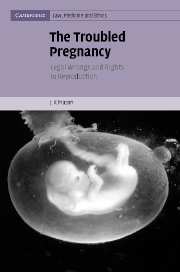Book contents
- Frontmatter
- Contents
- Preface
- Table of cases
- Table of statutes
- 1 The nature of the troubled pregnancy
- 2 Voluntary and involuntary termination of pregnancy
- 3 Antenatal care and the action for wrongful birth
- 4 Unsuccessful sterilisation
- 5 Uncovenanted pregnancy and disability
- 6 Wrongful neonatal life
- 7 The management of the disabled neonate
- 8 Conclusion
- Bibliography
- Index
5 - Uncovenanted pregnancy and disability
Published online by Cambridge University Press: 19 July 2009
- Frontmatter
- Contents
- Preface
- Table of cases
- Table of statutes
- 1 The nature of the troubled pregnancy
- 2 Voluntary and involuntary termination of pregnancy
- 3 Antenatal care and the action for wrongful birth
- 4 Unsuccessful sterilisation
- 5 Uncovenanted pregnancy and disability
- 6 Wrongful neonatal life
- 7 The management of the disabled neonate
- 8 Conclusion
- Bibliography
- Index
Summary
Introduction
We have seen how antagonistic the House of Lords has been to the grant of recompense for the upkeep of an originally unwanted but healthy child. There is no doubt that the tenor of the speeches was such as to raise doubts as to how, given the chance, they would approach a case of wrongful pregnancy resulting in a disabled child – remembering that they did, in fact, make no firm statements on the matter. Only two of their Lordships spoke to the point.
Lord Steyn had this to say:
Counsel for the health authority was inclined to concede that in the case of an unwanted child, who was born seriously disabled, the rule may have to be different. There may be force in this concession but it does not arise in the present appeal and it ought to await decision where the focus is on such cases.
And Lord Clyde was equally indefinite:
The present case relates to a conception which was followed by a successful birth of a healthy child. In the course of the argument this factor sometimes, but not at others, appeared to be of importance. If there is a distinction in cases of wrongful conception between those where the child is healthy and those where the child is unhealthy, or disabled or otherwise imperfect, it has to be noted that in the present case we are dealing with a normal birth and a healthy child.
- Type
- Chapter
- Information
- The Troubled PregnancyLegal Wrongs and Rights in Reproduction, pp. 150 - 187Publisher: Cambridge University PressPrint publication year: 2007



